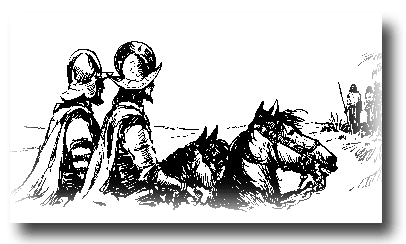In 1540, Francisco Vásquez de Coronado,
governor of modern day Sinaloa and Nayarit, set out with
an entourage of 340 Spanish, 300 Indian allies, and 1000
slaves, both native Americans and Africans, to find the
Seven Cities of Cibola described by Fray Marcos de Niza,
the Franciscan monk Coronado had sent out earlier to explore
the area north of his territory. After many hardships
and splinter expeditions, Coronado found seven Zuni Puebloan
villages of earth and stone. A far cry from the vivid
and richly embellished descriptions Fray Marcos had included
in his dispatches.
Meanwhile, the Coronado expedition's main
column, with more than 1000 people and several thousand
head of livestock, was advancing slowly but steadily up
the trail from Culiacan to overtake him with the expectation
of great riches. Coronado hoped that supplies, transported
on three vessels captained by Hernando Alarcon, would
soon reach him somehow from the Gulf of California. He
sent Melchior Diaz with the dual purpose of solidifying
the Spanish grip on a new settlement (San Hieronimo de
los Corazones) in the central Sonoran Desert, and to hurry
westward to meet with Alarcon's ships along the coast
of the gulf.
 According
to legend, during his travels Captain Melchior Diaz came
across a tribe of giants. Taking twenty-five of his "most
efficient men" and some guides, Diaz struck out toward
the north and west in search of the seacoast and the ships.
"After going about 150 leagues," reports Pedro de Castaneda,
"they came to a province of exceedingly tall and strong
men--like giants " Evidently, these were the Cocopa, a
Yuman tribe. According
to legend, during his travels Captain Melchior Diaz came
across a tribe of giants. Taking twenty-five of his "most
efficient men" and some guides, Diaz struck out toward
the north and west in search of the seacoast and the ships.
"After going about 150 leagues," reports Pedro de Castaneda,
"they came to a province of exceedingly tall and strong
men--like giants " Evidently, these were the Cocopa, a
Yuman tribe.
According to Castaneda, these huge Indians
went about mostly naked. "They . . . live," he adds, "in
large straw cabins built underground like smoke houses,
with only the straw roof above ground. They enter these
at one end and come out at the other. More than a hundred
persons, old and young, sleep in one cabin. When they
carry anything, they can take a load of more than three
or four hundredweight on their heads. Once when our men
wished to fetch a log for the fire, and six men were unable
to carry it, one of these Indians is reported to have
come and raised it in his arms, put it on his head alone,
and carried it very easily."
While among these Cocopas, the captain learned
that ships had been seen at a point three days down toward
the sea. But when Diaz' finally reached this place, he
saw no sign of a sail, even to the distant horizon. On
a tree near the shore, however, his party found this written
message: "Alarcon reached this place; there are letters
at the foot of this tree." Diaz dug up the letters and
learned from them how long Alarcon had waited for news
of the army and that he had gone back with the ships to
New Spain, i.e., Mexico.
Melchior Diaz decided to push on westward
in an attempt to reach the Pacific Ocean. It was near
the steaming mud volcanoes (presumably where the geothermic
plant is now) outside present day Mexicali that one of
the expedition's greyhound dogs began to bully their sheep.
Melchior spurred his horse in pursuit, drew back his lance
and threw it at the troublesome canine. He missed. The
lance buried itself in the ground at an angle that brought
the weapon upon him with unfortunate and deadly speed.
The butt end of the lance, capped with iron to give balance
to the weapon, drove itself into his groin.
Melchior's men carried their captain, suffering
terribly from his wound, for twenty days before Diaz finally
died. His body is presumably buried in the desert somewhere
west of the Imperial Valley.
Coronado's
Elegy Upon the Death of Melchior Diaz
Melchior, I heard it in the wind--
We set history on a new path
Such as we have seen rivers bend--
You, I history; like Euclid math.
Your spirit collides with mine over
That great gorge in the earth, and we kneel,
Before God--to know that such power
Sculpted this . . . this . . . shall we come and kneel?
Ah Melchior, why did death (God) take
You at the crease of fame? Why must I
Whisper good-bye to the air and stake
My claims to yours? Oh God, Mary why? Why!
Does the red canyon's path spell your
name
Melchior--Does its power contain
That which was you, all you--shall your fame
Ever reach to here, where drops of rain
Make no noise? Do I hear correctly,
That the future will know not of you
But of this canyon?--Your legacy
On this cold world--In three days you grew
A beard and still did not reach the bottom.
But I toast you with our finest mead
And ponder and ask you Melchior:
Who said that we should ever succeed?
|